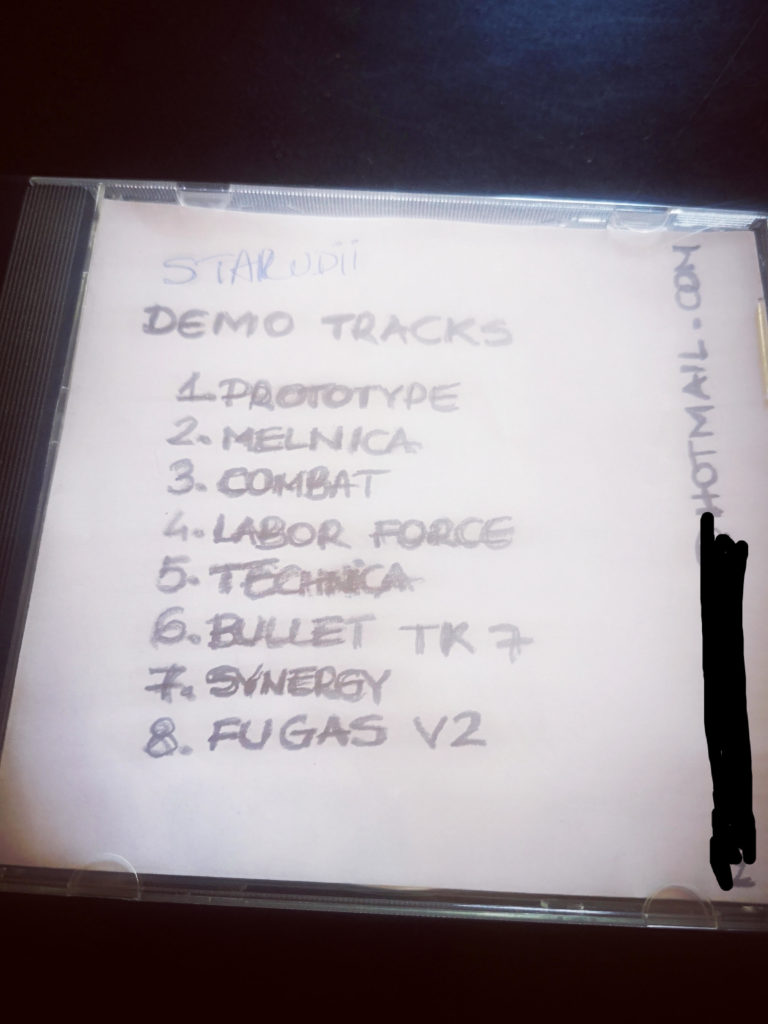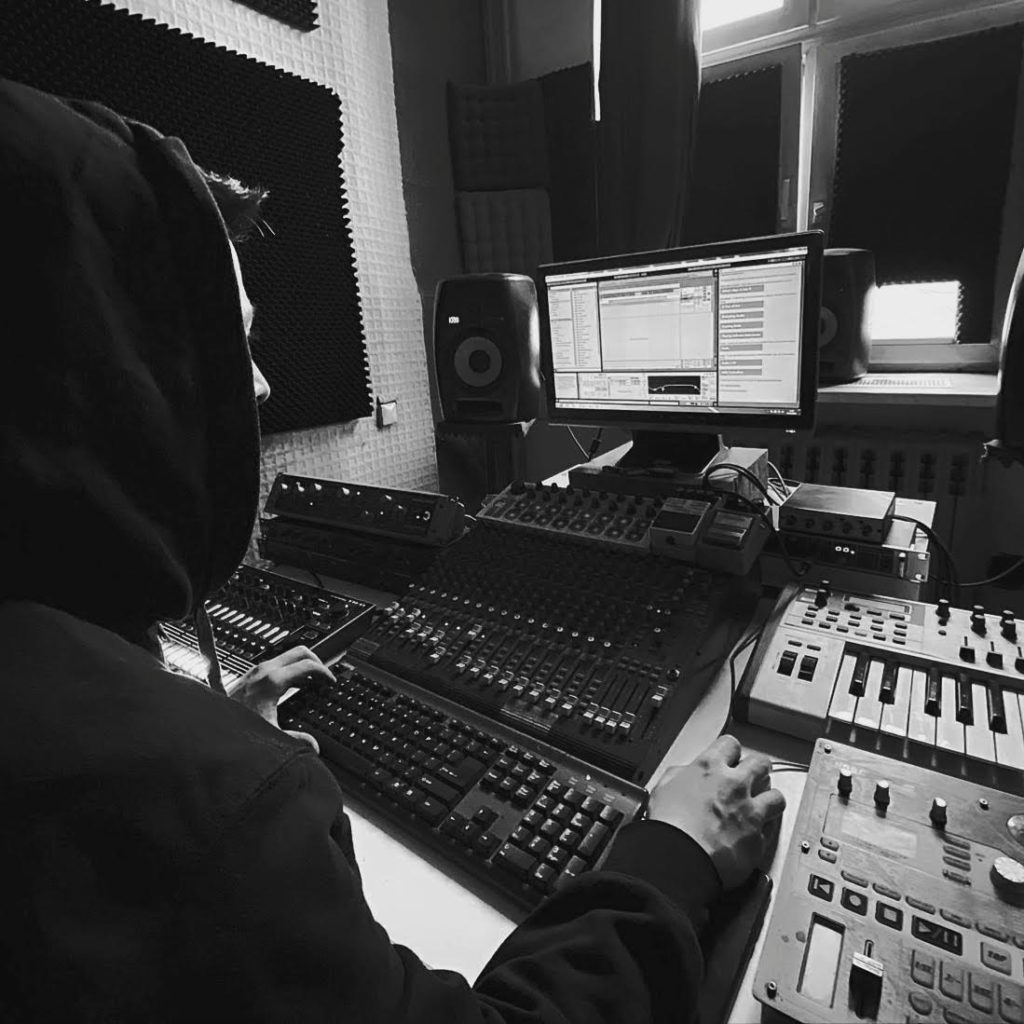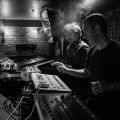
Macedonian techno talent Stojche discusses ‘Urban Chaos’ and pushing the envelope on ‘High Tech Soul’
Stojche (Cvetanovski) is a born and bred native of Skopje, the capital city of the Macedonia. Having grown up in this distinct urban melting pot nestled deep in the heart of Balkan Peninsula, he describes himself as a regular rebel, fighting the traps of urban chaos and 21st century life.
Over the last decade, he has slowly but surely etched his name on the Europe’s underground circuit, contributing his music to labels like A.r.t.less, DMK, Subwax, Grounded in Humanity, Sounds Benefit and Freund Der Familie alongside others. A purist and true spirit in every sense of the word, he was first immersed in the sounds of Detroit Techno and Chicago House as a youth.
As the cauldron of the Balkan conflict died down at the end of the 1990s, Stojche wholeheartedly embraced the futuristic sounds being beamed across the airwaves – ever growing in its popularity. A hotbed in every sense of the word for underground techno, as the country embraced its new identity; futuristic music took a deep root in Skopje and struck a real chord with a fresh faced generation of music lovers and ravers. The burgeoning scene really made its mark in the Macedonian capital with the likes of Derrick May and Juan Atkins rightly identifying it as a “GO TO” place for Motor City sounds. Totally hooked in, Stojche’s mania for vinyl set him on a path that would lead him to dig deeper and deeper into the phenomenon.
First devoting himself to DJing, after a decade he shifted into producing and co-founded Argumento Music in 2009. In 2011, he launched his solo imprint Tangible Assets. An outlet that has given him the freedom to explore and refine his trademark “dubbed out Detroit” influenced productions. The label reflects a personal statement with an emphasized appreciation for Techno’s history. You only need to check through his discography to realise he is one of a handful of people that is still pushing forward the timeless envelope of the “Hi Tech Soul” legacy.
Now based in Berlin, his DJ sets show the benefit of having spent two decades behind the turntables, renowned for consistently surprising high octane journeys that carry a powerful dose of emotional content. He constantly strives to balance finding inspiration with the pulse of the city life. Funneling his passion and pursuit of process into waveforms of intense sonorous shifts, when the needle hits the record – you really know this someone who is well in tune with their craft.
Reassuringly, it’s taken him until this year to record “Urban Chaos”, his first LP. Not that he believes in rushing anything, Stojche wins the argument hands down that the music and recording is 100% all the better for it. With such an impressive background and work focused ethic, amid these strange times of lockdown life and the COVID-19 pandemic. We were really pleased when he not only agreed to take the time to speak us, but also ponder over the questions we put to him in detail. Like all great ambassadors for music and their craft, there’s a genuine warmth and openness which is hard not to like. Here’s what he had to say…
First off – can you tell us why Skopje became such a “hotbed” for Techno music?
“In times of political uncertainty, tension and war knocking on our northern border, in 1991 Macedonia declared independence from the Former Yugoslavia. Even though the country escaped direct conflict, we were in the same basket of states that had economic embargos, oil shortages, recession, rising unemployment and so on. The money in our pockets was extremely limited. I really mean it. The slow recovery in the country brought some hope that we would see a brighter future. The development of Club Culture at the end of the 90s raised a real sense of togetherness and love. It was a form of escapism. Sometimes, myself and friends donated a few bucks so we could also buy a cheaper presale tickets for our mates that literally couldn’t afford to go to a rave. People really did feel a different energy in these techno parties. The vibe was infectious. Our Techno community enlarged and revealed an appetite for more. The expansion of the electronic music events in Skopje over time gave us the opportunity to see all Detroit Techno pioneers. The reception Derrick May, Juan, Kevin, Jeff Mills, Pullen, Larkin had in Skopje was like they were coming home. Techno music became the primal force of our cultural life. I think for a city of 1 million inhabitants, we should be proud what we achieved and what we have had up to date.”
What was your first experience of underground techno then?
“With my classmates or my boys from the hood… we used to listen and exchange tapes from The Prodigy, Crystal Method and Underworld. I remember when Josh Wink’s “Higher state of Consciousness’’ came out , it blew our minds away. Apollo 440 “Ain’t talking about Dub” was my childhood anthem and a huge hit on every radio station across the country. However, my first real Underground Techno experience was Derrick May in Ohrid, Macedonia. That party changed not only my life but the lives of many that were there. Even prior to that, Macedonia already had pretty solid underground techno scene. But I think for my generation, the Balance MK event in Ohrid with Derrick set the things on fire!”

How did your taste develop?
“I feel pretty blessed. I had so much exposure to the pick of Detroit Techno in my hometown. This classic 90s techno sound still feels fresh and continues to inspire me. UK Techno had a big influence too, combined with the records that came from Berlin, Tokyo, Amsterdam or Napoli too. I’ve always found that 12”s that carry a particular sentiment, emotion or funk seem to prick my ears more. My list of influences would be almost endless if I tried to name the labels or the artists in this context. Learning the foundations of the music theory gave me a much broader scope that there are some rules which should be kept while composing. When I started to analyse some tracks from a solely music perspective, I started to differentiate and recognise which records were undeniable musical masterpieces. The deeper I dived into it, more I realised the essence. To cut a long story short, all these influences are deeply grounded within me in the form of a mash up. I want to leave some evidence in my music that I carry big appreciation for Techno’s history, whilst persistently pushing forward the legacy that the godfathers of Techno have left to the world.”
When did you decide to put your first studio together and what equipment did you use?
“My mates from Sound Diffusion (Darko Spasovski and Aleksandar Vidinovski) had an equipped space in Skopje. I spent a lot of time with them in their studio. I was never particularly interested in releasing a record, but the more time I spent witnessing the process, my curiosity grew and grew. I learned a lot about the music production from them. I took notes about the essential software I needed to get started jamming at home. At the very beginning, I just used a computer, midi keyboard and a pair of monitors. All my initial records were made all in the box. Right now, it’s pretty different. I like to combine analogue gear with software because my sound really benefits from the best of both worlds.”
How long did it take you to become confident with sharing your productions?
“A looooooong time! Back in the day, I would only send 1 minute snippets to friends via Skype to get some feedback. Friends who I considered to have a similar taste and vision for the music that is. We valued each other’s feedback and criticism. Things like ‘improve your bass lie’, ‘fatten up the drums’, ‘your hihats sound too linear’, ‘I don’t get your chord progression’, ‘your kick sounds like it’s playing from a Coca-Cola can’. ‘The snare drum never had breakfast, beef it up’ – were thrown on my chat tabs. This was 10-15 years ago. When you’re at the start and you lack confidence in some tracks, surrounding yourself with likeminded people is a good thing. It simply helps the process for you to grow as an artist. Strahil Velchev (KiNK), Milos Pavlovic (Regen), Mareena or Dejan Tevdo (my local hero) witnessed all of that… good times. Right now, I still go through several phases before I’m clear in myself that ‘this tune is 100% finished’. I’ll test it in a club, test it in different sound environments and so on.”

You signed your first EP signed in 2009, how did the link up happen?
“I used to spend a lot of money on sending demo CDs to labels in the past and never got an answer or any feedback. I kind of lost hope that I was ever going to get a response. I started to doubt my tracks weren’t good enough. Shipping from Macedonia was quiet an expensive thing and I thought ‘I’m only wasting my money’. Around 2004/2005, the Techno style I was into kind of slowed down. The sound that many call ‘Minimal’ started becoming a mainstream focus. For me, ‘Minimal’ was Rob Hood.. not that. Many of my heroes completely changed the style they produced. Some today are barely a shadow of what they used to be. At that time, I felt really uncomfortable with the cycle going on in the underground scene. Many people started to dislike or get bored of banging upbeat techno, even BPM played important role when forming an opinion on music, which I find ridiculous. I was never a stranger to House music though. I’ve always jammed out housey stuff, instead of trying to fit in the scene I was never a fan of. One day, I uploaded some of my tracks to my Myspace profile which somehow lead to me linking with Dogmatik Records from London. When Alex Arnout wrote to me that he wanted to cut 4 of my tracks, I was still in disbelief that I was about to release a record! I thought, ‘Stojche on 12’’ vinyl’… that was never going to happen. It’s definitely a memorable feeling that still gives me goose bumps.”
What was your initial plan when you started putting records out?
“I never had any concrete plans really. Things just happened spontaneously. Together with Darko and Aleksandar from Sound Diffusion, we worked as a team. They had few records out, I had few records out and we launched our record label. It was a relatively natural progression. We threw all our money, passion and efforts behind the idea: Argumento Music kicked off as a platform with no boundaries in style really. We had 9 records out, but the label is on hold for now until a few issues get resolved. I launched Tangible Assets in 2011, I know the output ratio has been low so far, but this label is the best thing I’ve done for myself. It’s a solo platform where I feel complete freedom on what to cut. Disregarding if it’s a techno, house, electro or even a dub, I think it’s a blessing to be able to showcase different influences under one roof. To be able to live from music requires good planning, strategic thinking and good management. Approaching it like a business has become essential in the vibrant music industry we have today, but to be honest – I would rather outsource the management part to an agent. If my prime focus was on the business aspect of it, I’m quite certain that I would lose the hunger to pursue my average of 10 hours of studio time every day. I live, pay my bills and taxes only from what I earn in music. Sometimes, it’s a struggle for artists but it’s important not to lose the ground from under your feet and stay focused on the essential.”
How did things change for you when you relocated to Berlin?
“Berlin was a new chapter. It’s been 8 years since I moved here. I like it because certain things here are much more accessible. There are many great record shops which I visit regularly. I don’t need to wait for 2 weeks for my parcel to arrive anymore. I don’t need to pay ridiculous amount on customs import tax on vinyl or gear. To fly abroad from a Berlin airports is much cheaper in comparison to Skopje. Appreciation for art in Berlin is on a much higher scale than any place I’ve been to. The music has given me an opportunity to meet some fantastic people here. I think the overall vibe in Berlin is a stimulus for artists. But, the cost of living and operating here has dramatically changed in the last few years. I think the City council has some major challenges ahead of itself. Some fantastic clubs have been forced to close their doors. Tape club, Horst X-berg, Cookies, Arena, Stattbad Wedding, Griessmuehle to name a few. Also, other venues that are vital for the scene have been threatened with closure even prior to the Covid-19 pandemic. Club culture brings huge amounts of figures to Berlin’s bank account, so we need to see a bigger effort. For us, preserving our spaces and our culture is essential.”
What would say is the essence of your production philosophy is?
“I would define it as minor-scale funk. It sounds like hypocrisy at first but I think I have never produced a track in a major scale. I have a big fetish for warm chords that bring me in a moody territory. I’m not a big fan of linear drums patterns, because it sounds a bit too predictable for my taste. Funky drum or baseline patterns instantly grab my ear. There needs to be some element going to make me roll my head. Most of the time the goal is to find synergy, mutual language between these two. I’m waiting for that moment to happen within the process in the studio, and when it happens, THAT’S IT, LETS ROCK N’ROLL!!!”

Do you have a “go to” piece of equipment?
“Oh yes! my Electrix Filter Factory analogue filter is always switched on. I use it on drums, bass synths, on almost everything. It’s main purpose is to filter frequencies but I also use it to shape and modulate synths, and frequently as a colour unit to give a bit of character to particular elements. A lovely piece of gear, I highly recommend it.”
What was your initial idea for the album project… why Urban Chaos?
“After releasing many singles, remixes and appearing on different compilations, I had a desire to make an album dedicated to my city. Skopje is my constant source of inspiration. The feeling of nostalgia is present in me every second I’m not there. It took me around 2 years to produce the tracks that would eventually fit together. My graphic designer Aleksandar Tanchevski helped me out with the visual idea, so the entire concept crystalized and came into shape. Doing an album, everything has to fall in place so it has a meaningful purpose.
‘Urbanism’, ‘Chaos’, ‘Techno’ and ‘Skopje’ have a lot in common. Definition of Techno music in my own world is electronic, funky, emotive, syncopated, groovy: dynamic musical elements resulting in kinetic chaos. Why ‘Urban’? The urban character of the Macedonian capital has significantly changed in recent times. We’ve witnessed some corrupt political psychopaths taking the freedom to do facial surgery to our city without seeking the consent of the people. There was no crucial debate. It’s really disturbs me. Some places from my childhood don’t even exist right now. We’ve lost a lot of green space, which has resulted in high air pollution.
Any responsible politician that is dedicated to improving the situation would rather invest in infrastructure, technology, schools, hospitals or create green jobs. On the contrary, all the evidence shows they only bring crime: all we’ve seen is the destruction of the natural environment, corruption, greed and ‘0’ responsibility from the political elite in the last 30 years. Skopje is a city with a smile and shinning warm energy. It doesn’t deserve any of the humiliation that has happened. However, there’s no other place on the planet that could replicate my emotional attachment to Skopje. That’s how I feel about it.”
What’s been the BIGGEST lesson you’ve learned along the way?
“I should trust my intuition a lot more. It has barely lied to me. Pre-calculated human behaviour is a very interesting topic. I’m a person who is addicted to socialising and this lockdown has given me plenty of time to sit down with myself and rewind some fragments of my social activities. Because, my goal is to elevate myself into being a better person each day and keeping a strong dedicated mind-set, discipline and removing any distraction is actually the key. Sometimes we need to take radical measures to remove the fog in front of our eyes.




